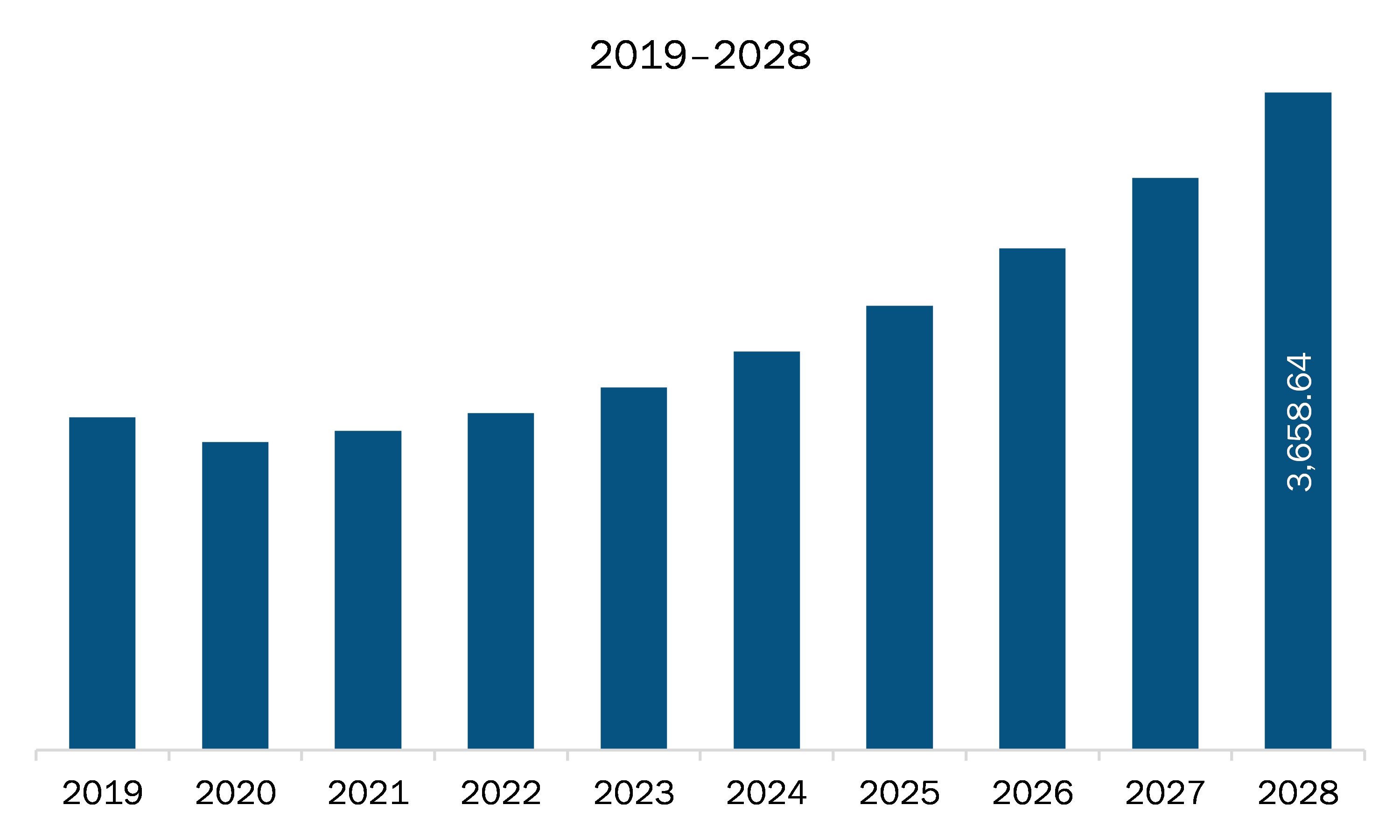The electronic toll collection system market in Europe is expected to grow from US$ 1,775.84 million in 2021 to US$ 3,658.64 million by 2028; it is estimated to grow at a CAGR of 10.9% from 2021 to 2028.
France, Germany, Italy, UK, and Russia are major economies in Europe. Demand for interoperable electronic tolling systems is the major factor driving the growth of the Europe electronic toll collection system market. The toll collection systems projects constitute a public-private partnership model where the government agency or state bodies usually decide the toll pricing. Also, the objective of toll collection has a profound influence over the vehicle classification and dynamic pricing for different category of frequent travelers. Thus, effectively restricting the interoperability of toll collection processes across different states, administrative regions, or province within the country as the toll collection system adopted generally lies at their discretion. However, the recent joint efforts by state and central government agencies for initiating a streamlined process for transit transaction across toll gateways, plazas, parking systems, and traffic management has gained traction in the past few years. Moreover, through collaborative efforts among different state bodies to participate in joint toll collection systems that are accepted by larger government agencies and offering simplified toll collection for different users. This electronic toll collection system operates on a pre-paid account-based system that is adopted by various state agencies for a seamless array of fright fees, toll, and fines across a wider geographical region of the country.Moreover, the data generated via electronic toll collection transponders and RFID tags could also provide meaningful insights into the traffic patterns and congestions at various expressways and highways. Subsequently, using those insights for improving the congestion, traffic management, and other intelligent transportation services. Also, the adoption of exhaustive interoperable toll collection system could also have application across parking fees payment at airports, malls, bus stations, and intelligent transportation services among other innovative services. Thus, the demand for interoperable and robust electronic toll collection by the government as well as state agencies is gaining popularity and is subsequently projected to fuel the demand for electronic toll collection systems in the coming years.
In Europe, France is the hardest-hit country by the COVID-19 outbreak. It is expected to suffer an economic hit due to the lack of revenue from various industries. Additionally, the outbreak of another variant of COVID-19 in the UK has affected the installation of electronic toll collection systems across Europe. Further, the businesses in the region (such as manufacturing and road & highway construction industries) faced severe economic difficulties as they had to suspend their operations or substantially reduce their activities. The growth of the electronic toll collection companies was hampered due to travel restrictions in Europe during the pandemic. However, manufacturing facilities, hospitals, airports, and warehouses have resumed working, and as a result, the travel and traffic have increased. For the tolling industry, the top priority during this pandemic is protecting the health and safety of the toll collectors and customers, and for that, companies are introducing new solutions to collect toll cashless. For instance, in July 2020, Tattile helped Serbia toll road by installing Vega Basic short-range cameras for automatic number plate recognition (ANPR). Vehicles digitally trigger the camera, which sends the image via TCP connection to the lane controller. But now, in 2021, with the release of lockdown restrictions and the beginning of the vaccination process, the road and highway construction activities have started again, and the raw materials are easily available. Thus, this will boost the growth of the electronic toll collection market in the region.
With the new features and technologies, vendors can attract new customers and expand their footprints in emerging markets. This factor is likely to drive the Europe electronic toll collection system market. The Europe electronic toll collection system market is expected to grow at a good CAGR during the forecast period.
Europe Electronic Toll Collection SystemMarket Revenue and Forecast to 2028 (US$ Million)

- This FREE sample will include data analysis, ranging from market trends to estimates and forecasts.
Europe Electronic Toll Collection System Market Segmentation
Europe Electronic Toll Collection System Market – By Offering
- Hardware Equipment
- Service
Europe Electronic Toll Collection System Market – By Technology
- ANPR
- GNSS
- DSRC
- Others
Europe Electronic Toll Collection System Market – By Application
- Highways
- Urban Area
Europe Electronic Toll Collection System Market, by Country
- France
- Germany
- Italy
- UK
- Russia
- Rest of Europe
Europe Electronic Toll Collection System Market - Companies Mentioned
- Conduent, Inc.
- Efkon GmbH
- Kapsch Trafficcom AG
- Neology
- Siemens AG
- SKYTOLL
- Thales Group
Europe Electronic Toll Collection System Report Scope
| Report Attribute | Details |
|---|---|
| Market size in 2021 | US$ 1,775.84 Million |
| Market Size by 2028 | US$ 3,658.64 Million |
| CAGR (2021 - 2028) | 10.9% |
| Historical Data | 2019-2020 |
| Forecast period | 2022-2028 |
| Segments Covered |
By Offering
|
| Regions and Countries Covered |
Europe
|
| Market leaders and key company profiles |
|
- Historical Analysis (2 Years), Base Year, Forecast (7 Years) with CAGR
- PEST and SWOT Analysis
- Market Size Value / Volume - Regional, Country
- Industry and Competitive Landscape
- Excel Dataset
Recent Reports
Testimonials
Reason to Buy
- Informed Decision-Making
- Understanding Market Dynamics
- Competitive Analysis
- Identifying Emerging Markets
- Customer Insights
- Market Forecasts
- Risk Mitigation
- Boosting Operational Efficiency
- Strategic Planning
- Investment Justification
- Tracking Industry Innovations
- Aligning with Regulatory Trends






















 Get Free Sample For
Get Free Sample For